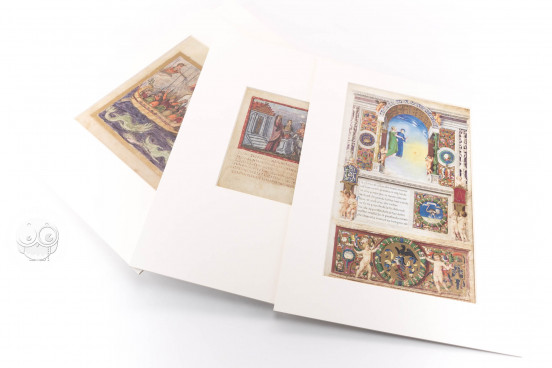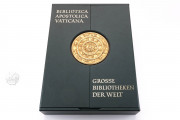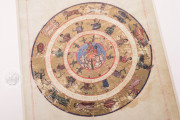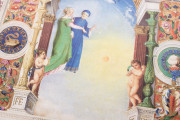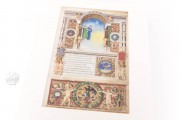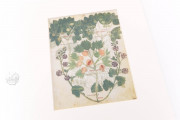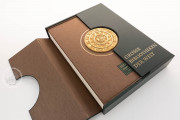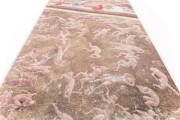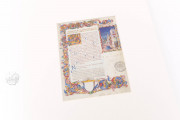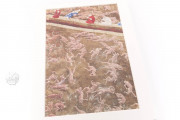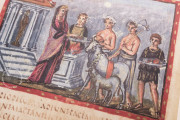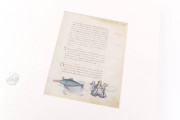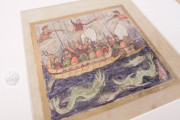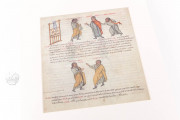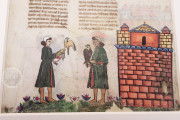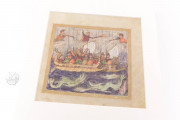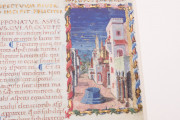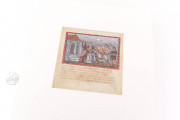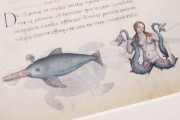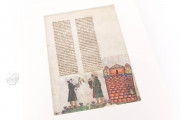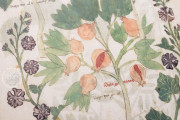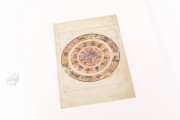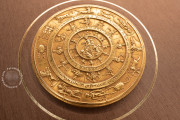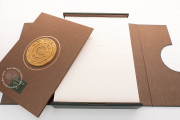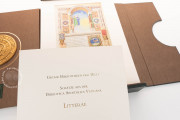Only cognoscenti know that the Vatican also possesses an outstanding collection of manuscripts of works of literature and science. The founder of the library, Pope Nicholas V (1447?–?1455), was an important humanist and collector of books. The present collection, Litterae, underlines the importance of the secular manuscripts for the Vatican Library.
A Papal Confession of Humanism and Universality
Pope Benedict XVI himself expressed the principle of a cosmopolitan attitude in a personal message of greeting: “From its very beginnings it (= the Vatican Library) has maintained the inimitable, truly ‘catholic’, universal openness towards all that mankind has produced over the centuries: all that is noble, right, sincere and amiable (see Phil 4,8).
The Vatican Library is not a theological or predominantly religious library; true to its humanist origins and in accordance with its vocation it is open to that which is human; and so its purpose lies in the service of culture.”
Over the centuries the Popes have turned their attention beyond the spiritual in the narrow sense towards the “truly human”, and have collected books that serve the search for truth: conscious or unconscious, religious or secular.
Litterae
The twelve sheets assembled represent the most important secular manuscripts in the Vatican Library. The selection was made according to two criteria: the manuscripts considered were those that are either of great importance for the handing down of manuscripts by classical authors, or those that are of great significance in the history of book art and illustration.
The manuscripts extend for over 1,000 years. The oldest manuscript represented in this boxed set is the famous Vergilius Vaticanus fragment from the fourth to fifth century, with texts from the Georgics and the Aeneid.
In addition to another Virgil manuscript (sixth century), other highlights of the collection include a facsimile sheet from the Falconry Book of Frederick II (thirteenth century); a scene from Dante’s Divine Comedy illustrated by the great Sandro Botticelli (fifteenth century); and the astrological table from a Byzantine Ptolemy manuscript (eighth to ninth century).
The astrological table was also used as the model for the real gold gilt brass plate decorating the box containing the sheets.
Leaves included in the box
1. Opfer der Dido - Vergilius Vaticanus Vat. Lat. 3225, Fol. XXXIII - Rom, 4-5 Jahrundert
2. Zwei Schiffe im Sturm - Vergilius Romanus Vat. Lat. 3867, Fol. 77 - Rom 6 Jahrundert
3. Vermesser vor dem Kaiser - Karolingischer Agrimensorencodex Pal. Lat. 1564, Fol. 4 - Niederrein, erste Halfte 9. Jahrundert
4. Masken - Terenz. Koemodien Vat. Lat. 3868, Fol. 46 - Westdeuyschland (Aachen) oder Lothringen, um 825
5. Falkenhauser - Friedrich II, De Arte Venandi cum Avibus (Falkenbuch) Pal. Lat. 1071, Fol. 90 - Unteritalien, 1258-66
6. Titelblatt des "Paradieses" mit Dante und Beatrice - Dante Alighieri Divina Commedia (Gottliche Komodie) Urb. Lat. 365, Fol. 197 - Urbino und Ferrara, 1478-82
7. Die Gewalttatingen Gegen die Glottiche Ordnung - Sandro Botticelli, Dante Reg. Lat. 1896, Fol. 99 - Florenz 1480-90
8. Meerjungfrau (Tiere una Fabelwesen des Meeres) - Petrus Candidus Decembrius, Tierbuch Urb. Lat. 276, Fol. 193 - Lombardei, 1460
9. Falkenszene - Pal. Lat. 1989, Fol. 174 - Paris 1414
10. Atrologische Tafel (Trierkreis) - Claudius Ptolomaeus Handtafel-Codex Vat. Gr. 1291, Fol. 9 - Konstantinopel, 8-9 Jahrundert
11. Optik - Euklid von Alexandria, Optik Urb. Lat. 1329, Fol. 1 - Italien, 15 Jahrundert
12. Granatapfel - Dioscurides, Sammlung der Heilmittel Chig. F. VII 158, Fol. 56 - Italien, um 1400
We have 1 facsimile edition of the manuscript "Treasures from the Biblioteca Apostolica Vaticana - Litterae": Schätze der Biblioteca Apostolica Vaticana - Litterae facsimile edition, published by Faksimile Verlag, 2012
Request Info / Price
